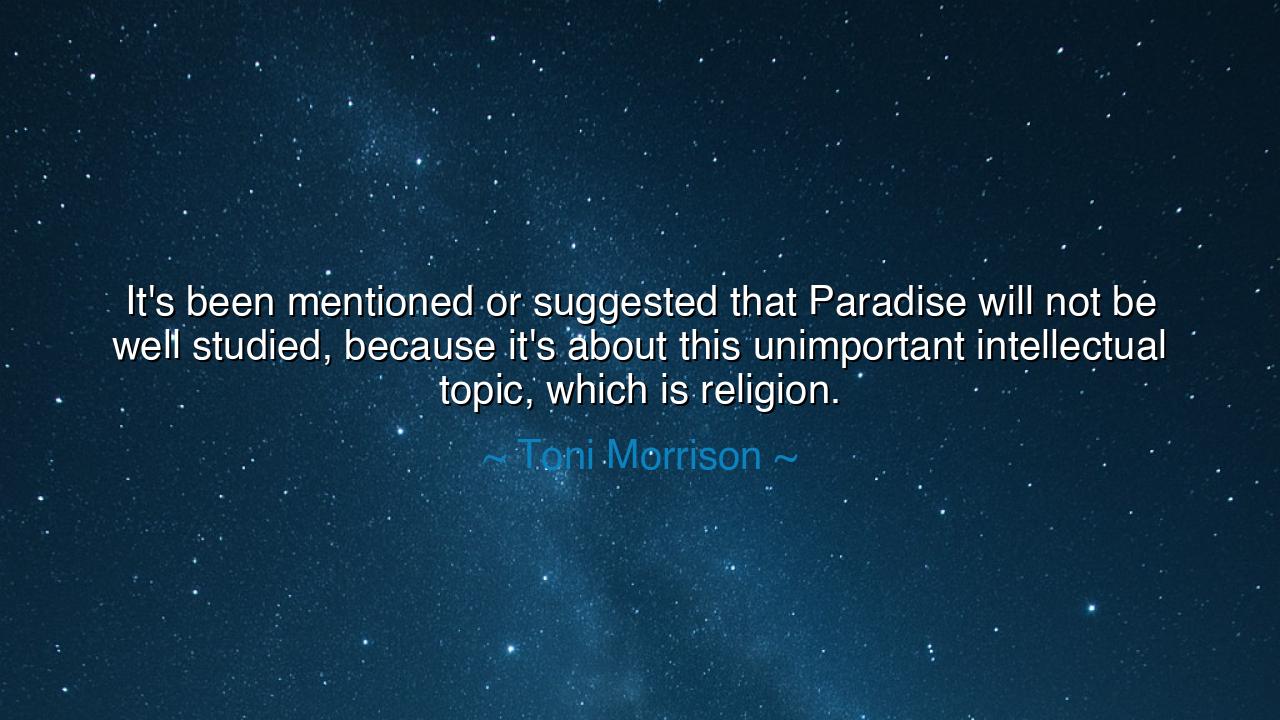
It's been mentioned or suggested that Paradise will not be well
It's been mentioned or suggested that Paradise will not be well studied, because it's about this unimportant intellectual topic, which is religion.






Toni Morrison, the oracle of American letters, once lamented with quiet fire: “It's been mentioned or suggested that Paradise will not be well studied, because it's about this unimportant intellectual topic, which is religion.” In this statement she exposes a grievous wound in modern thought: that religion, once the heartbeat of civilizations, the source of art, law, and moral vision, is now dismissed by some as an irrelevant subject, unworthy of serious study. Morrison names the irony: her novel Paradise dares to wrestle with faith, with conflict born of belief, with the hunger for transcendence—and yet it risks neglect precisely because it grapples with this eternal theme.
The ancients would have laughed—or wept—at such neglect. To them, religion was never “unimportant.” The Egyptians built pyramids as acts of devotion to gods and kings. The Greeks raised temples and wrote tragedies that asked how mortals must live under divine law. The Hebrews inscribed covenant into their very identity. For millennia, faith was not a marginal question but the core of human existence. To say religion is “unimportant” is to turn one’s back on the very soil from which cultures have sprung.
Morrison’s lament reflects not only literary critique but also social history. In an age dominated by science, technology, and commerce, many have grown to see religion as a relic, useful perhaps for personal comfort but irrelevant to intellectual inquiry. And yet, religion continues to shape politics, fuel wars, inspire revolutions, and give birth to both great acts of compassion and terrible acts of violence. To ignore it is to be blind to the forces that have carved the human journey. Morrison warns: if we neglect this subject, we risk misunderstanding both literature and life.
Consider the example of Dante Alighieri, whose Divine Comedy is one of the most studied works in world history. At its core, it is wholly about religion—sin, redemption, heaven, and hell. To dismiss its subject matter as trivial would be to lose the very foundation of its brilliance. And yet, Morrison faced a modern world where a book like Paradise, steeped in the conflicts of faith and community, could be brushed aside simply because it dared to make religion its central concern. This is not only an insult to her work, but to the human condition itself.
Her words also contain an act of resistance. Morrison insists through her art that religion cannot be stripped away from intellectual life. In Paradise, she depicts communities wrestling with exclusion, grace, judgment, and forgiveness. These are not peripheral concerns; they are the heart of what it means to be human. To ignore them is to study the body of literature while leaving out its soul. Morrison thus challenges readers and critics alike to see that faith, doubt, and the sacred are as worthy of study as politics or economics.
The meaning of the quote is therefore both a warning and a call. It warns us of a cultural blindness—the refusal to see religion as a serious force—and it calls us to reawaken respect for the intellectual depth that faith, myth, and spiritual longing carry. Morrison tells us that to treat religion as unimportant is to diminish our understanding of humanity itself. For every society is shaped by what it worships, and every literature bears the trace of its sacred visions.
The lesson for us is clear: never dismiss the study of religion. Whether or not you believe, learn from it. For in its stories, you will find the fears, hopes, and dreams of generations. In its rituals, you will see how communities forged identity. In its texts, you will encounter the questions that refuse to die: Who are we? Why are we here? How shall we live?
Practical actions follow. Read works that engage religion, even if they challenge your own worldview. Approach them with humility, seeking understanding rather than dismissal. Recognize that in literature, art, and history, religion is not a side note but a central melody. And when you engage with others, respect the sacred as part of their humanity.
O seeker, remember Morrison’s wisdom: religion is not unimportant—it is a lens through which humanity has always sought meaning. To neglect it is to neglect ourselves. Therefore, study it, wrestle with it, honor its role in our history and our literature. In doing so, you preserve not only the soul of the past, but also the wisdom needed for the future.






AAdministratorAdministrator
Welcome, honored guests. Please leave a comment, we will respond soon